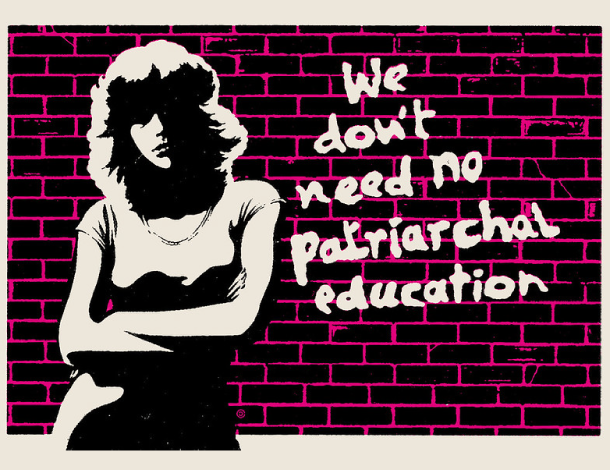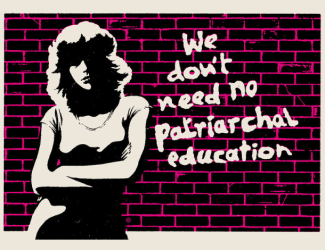A spectre is haunting feminism - the spectre of gender.
We all know the expression “discrimination on the basis of sex” from legal documents. Historically, the concepts of sex and gender have often been used interchangeably. Yet, the recent ‘sex-based rights’ agenda seeks to establish a new - and extremely patriarchal - meaning of what being a woman is.
What’s more confusing is that this agenda is championed not only by conservative right wing groups, but also by some trans-exclusionary feminists. We witness it in international events like the the United Nations’ Commission on the Status of Women (CSW), taking place these days in UN headquarters and online, and in attempts to influence national gender policy.
What is this notion of ‘sex-based’ all about?

We don't need no patriarchal education
It’s the idea that women experience oppression in society not because of their gender, but because of their sex. Why is this a big deal? Good that you ask. Mainly, it reduces women to outdated and non-scientific perceptions of binary biological sex. Reduction of women to body and reproduction is as old as patriarchy itself. It doesn’t even reduce us to our bodies. It reduces us to false ideas about our bodies, as if all women in the world have the same genitalia, the same reproductive organs and systems, the same chromosomal and hormonal make-up; and, as if intersex people did not exist. Life and science tell us that’s not the reality; but it is a powerful picture of reality, and it violently erases each and every one of us who doesn’t fit into it.
Since Sojourner Truth exclaimed “Ain’t I a Woman?” in 1857, Black, Indigenous, lesbian, trans and other feminists have extensively criticized the assumption of a “universal experience” of all women, which always ends up being a very particular one - most often privileged, middle-class, white, heterosexual, able bodied, and the list goes on. “Sex-based” rhetoric that assumes universal reality and experience of body and of oppression is no different.
The ‘sex-based’ approach offers a seemingly simple distinction - sex is the biological fact, gender is a subjective feeling - and it is fundamentally wrong about both. Gender is more than a feeling, it is a feminist concept that helps us understand that the meaning of being a woman (or a person of any gender) is defined by society and culture, and can also be challenged and changed over time. It is about claiming our autonomy to define what being (or not being) a woman in society means to us, and what our body means to us. While it is now widely understood that gender norms are socially constructed, gender theorists like Judith Butler have showed that the binary category of sex is in itself socially constructed too.
Changing the way we think about sex isn’t easy, but let’s take on the challenge anyway, and start with a story.
Since 2017, an ultraconservative anti-rights group CitizenGo has been touring its bus with the message “boys have penises and girls have vaginas” (later they changed it to “boys are boys and girls are girls”). From Spain their bus travelled as far as Germany, Kenya, and even the United Nations headquarters in New York City, the United States.
For many people, the Citizen Go message is common sense. The thing is, there’s always been a very special relationship between “common sense” and misogynist bullshit. After all, the triumph of oppression is when it becomes common sense or second nature. Biology has been used throughout history to claim supremacy and inferiority, and justify colonialism, violence and oppression. But here’s the reality: boys, girls, and folks of all genders, have different genitalia, different reproductive organs, different make-ups of chromosomes and hormones. And the meaning we assign to our bodies and organs change throughout our life and across cultures and societies.
Growing up, most of us do learn that boys have penises and girls have vaginas.
We also learn that a woman’s natural place is in the kitchen, that women exist to satisfy and serve their husbands, that a woman’s main purpose and duty in life is to make babies - for the family, for the nation - and her biology is the ultimate proof.. We learn - from fairy tales, popular culture, advertising - that pretty means good and happy, and ugly means bad, miserable and forever alone. That princesses are young, thin and able-bodied, often white, and so is beauty itself. That it’s the witches who can be old, fat, disabled, and so is ugliness itself. It gets under our skin, we internalize it and many of us feel it when we grow up and look in the mirror. We also learn that body hair is not feminine, that it is disgusting and unhygienic, as is menstrual blood (hygiene is a well known tool of patriarchal and colonial control that has very little to do with health but everything with power and domination). When this is the state of ‘common sense’ about sex and gender, unlearning becomes a life-long project.
As feminists, we learn to question these ‘truths’, these types of common sense.
We learn to expose them as not the natural description of reality, but as false and oppressive ideologies and norms that were made common, as a means to control and humiliate us. We articulate our own ideas and narratives, we create theory and art and culture that reflect and celebrate our experiences, our bodies, our lives.
How we perceive and feel about our bodies and about other people’s bodies can change. You can peel off layers of self-hatred over the years and find beauty and wonder in the parts of yourself you were once ashamed of. Growing up indoctrinated that fat is ugly and body hair is disgusting, many of us still come to change our tastes and our desires.
Of course, you can’t just force yourself into this change, even if you are fully on board with the theory. It’s not about forcing - or being politically-correct - it’s about us being magical creatures who are capable of learning and growth. When we learn new ways of thinking and comprehending, when we experience art and culture that celebrates different bodies and gives them different meanings, when we are part of subcultures and communities that value people like us and bodies like ours, it shifts something in our minds, our hearts, our imaginations and even in our subconscious. Or you just happen to meet people who rock your world and make you question everything you think you knew about yourself and your desires. We change, and that sometimes feels like magic.
For many of us, the one about gendered genitals is among the hardest to change our perception of. In patriarchal cultures the penis often symbolizes power and is therefore the center of the universe. The vagina (or rather vulva) symbolizes… well, they shouldn’t symbolize anything because they’re dirty and must be hidden from view and language. If we reject the latter, why not the former too?
I will not pretend that I cannot understand where the fixed perception of genitals is coming from. In a culture that wants you to bow down to the all-powerful phallus, it seemed tempting to reject it altogether. It took me quite a while to understand these are two sides of the same coin: accepting the power of cis-hetero-patriarchy to define the meaning of bodies. Ironically, both ultraconservative anti-rights groups and trans-exclusionary women’s groups share this view. After all, this power is a source of oppression, from hating your own body to exercising violence against others. Reimagining the body, freeing ourselves from the patriarchal hold over it, is at the core of the radical feminist project.
So here’s why as a radical lesbian feminist I stopped stressing about genitals.
First and foremost, I love women, and this means respecting and cherishing our bodies, which as we’ve already established come in great diversity, genitals included. I care more about the meaning that women and queers attribute to our bodies, than the meaning attributed to them by our conservative societies.
Second, while the patriarchy does make the penis the center of the universe - and also as a fairly tall and large woman myself - I simply refuse to be intimidated by such a small organ. Or to go along with misogynist objectification that fragments our bodies into organs.
And finally, my perception of who and what is a woman is informed by the many beautiful - and yes, complex - ideas of gender, body and society developed by radical feminists, lesbians, trans folks and genderqueers, who are all but conservative and binary. Those who rebel against patriarchal hold of our bodies, be it physical or symbolic. Those for whom “sex-based” could never be about transphobic and transmisogynist bigotry and violence, but about sexual adventures, one-night stands, and playful encounters. About emancipation, exploration and pleasure. Which is exactly what “sex-based” should mean.
